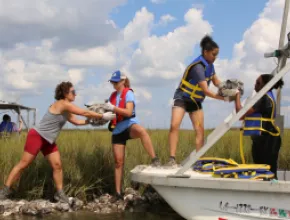I'd like to propose my organization start some CSR practices at our events. How should I begin?
This is a really common question I get. The basic answer is just start. Start doing something. It could be very simple things like putting in a recycling program or eliminating bottled water or reducing printing on paper or printing of signage. This would at least be doing something.
The real answer though, of course, is to treat it the same way you treat your event planning. Start with a vision--what do you want to accomplish? Create some goals that you can measure (reduce paper printing by x% or divert x% of overall waste from landfill by recycling, composting or reusing materials, etc.). Then execute on those objectives and measure them so you know if you were successful. One of the best things you can do is create a small green team or task force that is made up of all of the stakeholders in the event supply chain internally and externally and work together on common objectives so that everyone is working toward the same goals and overall vision. Start small, with things you know you can accomplish and then build on that in subsequent events. Sustainability is a journey with lots of learning and practice along the way.
Do APEX, ISO or GRI offer formulas to show the relation between bottled waters not used and resulting economic, environmental and social savings?
Short answer is no. It would be great if there was a central place to go to find calculators for these things. None of the standards offer technical information or a formula that would enable you to calculate the life-cycle benefits of a planning decision. You'd have to create these yourself, or find external tools that do it for you. For example the EPA's waste wise calculator shows the GHG benefits of the decision to recycle mixed materials. The Environmental Paper Network Paper Calculator shows you the benefits of using recycled content paper. These tools are patchy so don't cover many planning decisions, but more are available year by year. We have a few we've researched and created internally in addition to those I've mentioned.
I'm not aware of any tools that presently calculate the social aspect. It's largely environmental. And, you can calculate the economic based on number of bottles not bought. A little harder to calculate are other economic factors, but could be done with some time and research.
Will the APEX standards be finalized and launched to the planning/sourcing community?
Eight of the nine standards are approved and pending publication. The ninth (accommodations) should be finished soon. The way to get the published standards is to go on the Convention Industry Council website (www.conventionindustry.org/index.aspx) and follow the progress. When they are actually published, this is where people should be able to find them. Planners and suppliers will be able to get access to them.
How do you communicate to attendees so that changes are not negatively perceived as a lack in hospitality and anticipating their needs?
I think there a few ways to do this. You can build a sustainability section into the event website and communicate what you are doing and why. You can blog about it. You can have some (sustainable) signage around the event (near water stations, for example) with some facts about the impact you are reducing or fun facts about water or other resources. I really think the best way is to just build the sustainability practices into the event consistently and make sure that the other elements of the event are so great and so rewarding that it's not even an issue. If their overall needs and expectations are met, or even exceeded in terms of hospitality and attendee experience, it should mitigate any risk from doing things more sustainably in terms of perception.
How do we get hotels/conference centers to commit to recycling, as well? We eliminated bottled water about two years ago, which our attendees were slightly negative to, but they evidently understood. However, we still have soda cans. Is it as simple as asking hotels, etc., to have recycling containers around the spaces to ensure the cans are disposed of properly?
I wish it was that simple. This is where it probably takes some work to really get hotels to do the practices you would like them to do. There are hotels that are starting to do this. The Doubletree in Portland has been a real leader here. The reality is that a lot of the major chains are now starting to put green meeting programs in place, but this still doesn't guarantee that the operations throughout a given hotel will meet your needs. The other problem is that many hotels are not owned by the brand, they are franchises with individual owners or hotel management group owners and they don't always follow the programs that the corporate offices would like to have in place. This is probably something that you have to negotiate up front and try to get into your RFP or contract language and work with the hotel early on. I'll admit this is not easy for smaller events. It helps if you have a big event and a lot of buying power to get the hotel to listen and work with you.





